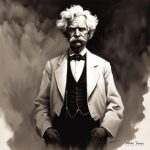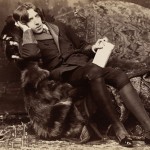
Nothing could have been better than Mr. Emery Walker’s lecture on Letterpress Printing and Illustration, delivered last night at the Arts and Crafts. A series of most interesting specimens of old printed books and manuscripts was displayed on the screen by means of the magic-lantern, and Mr. Walker’s explanations were as clear and simple as his suggestions were admirable. He began by explaining the different kinds of type and how they are made, and showed specimens of the old block-printing which preceded the movable type and is still used in China. He pointed out the intimate connection between printing and handwriting—as long as the latter was good the printers had a living model to go by, but when it decayed printing decayed also. He showed on the screen a page from Gutenberg’s Bible (the first printed book, date about 1450-5) and a manuscript of Columella; a printed Livy of 1469, with the abbreviations of handwriting, and a manuscript of the History of Pompeius by Justin of 1451. The latter he regarded as an example of the beginning of the Roman type. The resemblance between the manuscripts and the printed books was most curious and suggestive. He then showed a page out of John of Spier’s edition of Cicero’s Letters, the first book printed at Venice, an edition of the same book by Nicholas Jansen in 1470, and a wonderful manuscript Petrarch of the sixteenth century. He told the audience about Aldus, who was the first publisher to start cheap books, who dropped abbreviations and had his type cut by Francia pictor et aurifex, who was said to have taken it from Petrarch’s handwriting. He exhibited a page of the copy-book of Vicentino, the great Venetian writing-master, which was greeted with a spontaneous round of applause, and made some excellent suggestions about improving modern copy-books and avoiding slanting writing.
A superb Plautus printed at Florence in 1514 for Lorenzo di Medici, Polydore Virgil’s History with the fine Holbein designs, printed at Basle in 1556, and other interesting books, were also exhibited on the screen, the size, of course, being very much enlarged. He spoke of Elzevir in the seventeenth century when handwriting began to fall off, and of the English printer Caslon, and of Baskerville whose type was possibly designed by Hogarth, but is not very good. Latin, he remarked, was a better language to print than English, as the tails of the letters did not so often fall below the line. The wide spacing between lines, occasioned by the use of a lead, he pointed out, left the page in stripes and made the blanks as important as the lines. Margins should, of course, be wide except the inner margins, and the headlines often robbed the page of its beauty of design. The type used by the Pall Mall was, we are glad to say, rightly approved of.
With regard to illustration, the essential thing, Mr. Walker said, is to have harmony between the type and the decoration. He pleaded for true book ornament as opposed to the silly habit of putting pictures where they are not wanted, and pointed out that mechanical harmony and artistic harmony went hand in hand. No ornament or illustration should be used in a book which cannot be printed in the same way as the type. For his warnings he produced Rogers’s Italy with a steel-plate engraving, and a page from an American magazine which being florid, pictorial and bad, was greeted with some laughter. For examples we had a lovely Boccaccio printed at Ulm, and a page out of La Mer des Histoires printed in 1488. Blake and Bewick were also shown, and a page of music designed by Mr. Horne.
The lecture was listened to with great attention by a large audience, and was certainly most attractive. Mr. Walker has the keen artistic instinct that comes out of actually working in the art of which he spoke. His remarks about the pictorial character of modern illustration were well timed, and we hope that some of the publishers in the audience will take them to heart.
Next Thursday Mr. Cobden-Sanderson lectures on Bookbinding, a subject on which few men in England have higher qualifications for speaking. We are glad to see these lectures are so well attended.
- 100 Screenwriting Ideas to Get You Writing - January 20, 2026
- 100 Winter Storm Writing Prompts - January 17, 2026
- 100 Haunted House Story Starters: Craft Your Scariest Tale Yet - January 10, 2026



